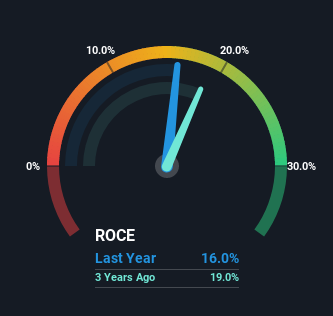- United States
- /
- Leisure
- /
- NYSE:YETI
Investors Met With Slowing Returns on Capital At YETI Holdings (NYSE:YETI)
To find a multi-bagger stock, what are the underlying trends we should look for in a business? Firstly, we'd want to identify a growing return on capital employed (ROCE) and then alongside that, an ever-increasing base of capital employed. This shows us that it's a compounding machine, able to continually reinvest its earnings back into the business and generate higher returns. That's why when we briefly looked at YETI Holdings' (NYSE:YETI) ROCE trend, we were pretty happy with what we saw.
What Is Return On Capital Employed (ROCE)?
For those who don't know, ROCE is a measure of a company's yearly pre-tax profit (its return), relative to the capital employed in the business. The formula for this calculation on YETI Holdings is:
Return on Capital Employed = Earnings Before Interest and Tax (EBIT) ÷ (Total Assets - Current Liabilities)
0.16 = US$108m ÷ (US$1.0b - US$330m) (Based on the trailing twelve months to April 2023).
Therefore, YETI Holdings has an ROCE of 16%. That's a relatively normal return on capital, and it's around the 19% generated by the Leisure industry.
See our latest analysis for YETI Holdings

Above you can see how the current ROCE for YETI Holdings compares to its prior returns on capital, but there's only so much you can tell from the past. If you'd like, you can check out the forecasts from the analysts covering YETI Holdings here for free.
SWOT Analysis for YETI Holdings
- Debt is not viewed as a risk.
- Earnings declined over the past year.
- Annual earnings are forecast to grow faster than the American market.
- Trading below our estimate of fair value by more than 20%.
- Revenue is forecast to grow slower than 20% per year.
How Are Returns Trending?
While the current returns on capital are decent, they haven't changed much. The company has consistently earned 16% for the last five years, and the capital employed within the business has risen 93% in that time. Since 16% is a moderate ROCE though, it's good to see a business can continue to reinvest at these decent rates of return. Over long periods of time, returns like these might not be too exciting, but with consistency they can pay off in terms of share price returns.
What We Can Learn From YETI Holdings' ROCE
To sum it up, YETI Holdings has simply been reinvesting capital steadily, at those decent rates of return. In light of this, the stock has only gained 1.9% over the last three years for shareholders who have owned the stock in this period. So because of the trends we're seeing, we'd recommend looking further into this stock to see if it has the makings of a multi-bagger.
If you want to continue researching YETI Holdings, you might be interested to know about the 1 warning sign that our analysis has discovered.
While YETI Holdings isn't earning the highest return, check out this free list of companies that are earning high returns on equity with solid balance sheets.
New: Manage All Your Stock Portfolios in One Place
We've created the ultimate portfolio companion for stock investors, and it's free.
• Connect an unlimited number of Portfolios and see your total in one currency
• Be alerted to new Warning Signs or Risks via email or mobile
• Track the Fair Value of your stocks
Have feedback on this article? Concerned about the content? Get in touch with us directly. Alternatively, email editorial-team (at) simplywallst.com.
This article by Simply Wall St is general in nature. We provide commentary based on historical data and analyst forecasts only using an unbiased methodology and our articles are not intended to be financial advice. It does not constitute a recommendation to buy or sell any stock, and does not take account of your objectives, or your financial situation. We aim to bring you long-term focused analysis driven by fundamental data. Note that our analysis may not factor in the latest price-sensitive company announcements or qualitative material. Simply Wall St has no position in any stocks mentioned.
About NYSE:YETI
YETI Holdings
Designs, retails, and distributes outdoor products under the YETI brand name.
Flawless balance sheet and good value.
Similar Companies
Market Insights
Community Narratives




